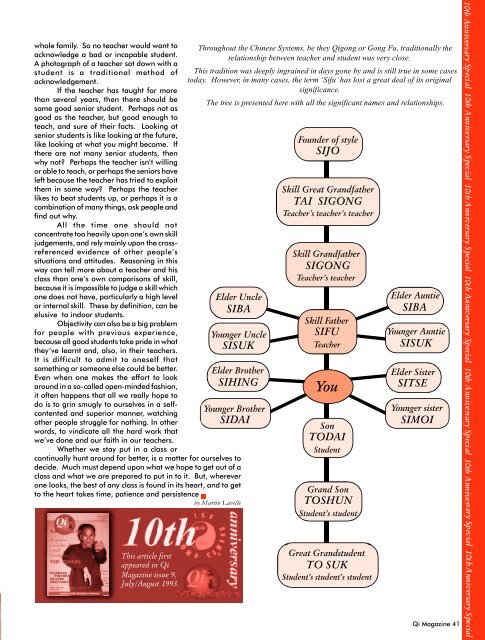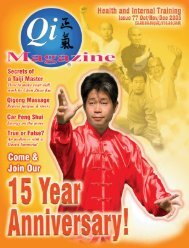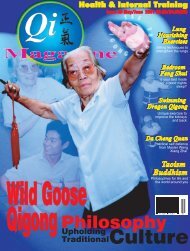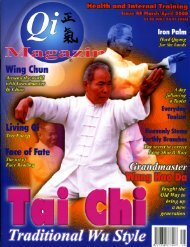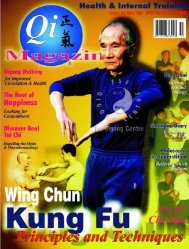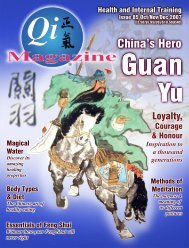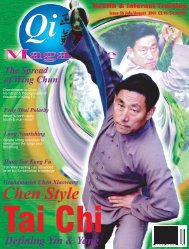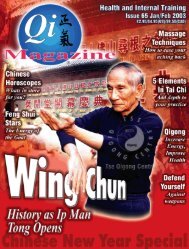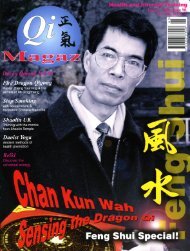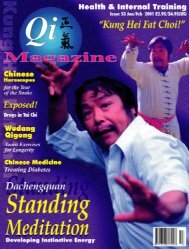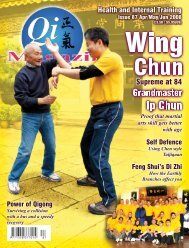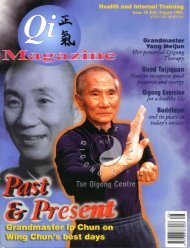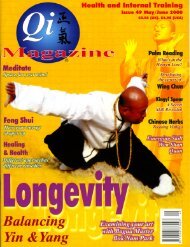10th Anniversary Special 10th Anniversary Special 10th Anniversary Special 10th Anniversary Special 10th Anniversary Special 10th Anniversary Special 10th Anniversary SpecialThe ChineseFamily TreeUnderstanding and coming to terms withan ancient and hidden tradition.Much like any normal family tree, the Chinese familytree refers to chronological lists of people, stemmingfrom common beginnings. It differs because thefamily members are not necessarily tied by blood,but instead by the passing on of skills. So for example a person’steacher becomes their father (or mother), and a person’s studentbecomes their son (or daughter). More important than thetree itself, is the mentality and tradition that it symbolises. Tofully understand this and its impact upon class life, we need totake a look at its origins.Many of today’s Chinese martial art and <strong>Qigong</strong> skillshave a strong basis in the cultural heritage of China. Culturalcornerstones like the Book of Changes, the Yellow Emperor’sClassic of Internal Medicine, or the Canons of Boxing, formpart of most systems, many of which have evolved from withinChina’s large family clans. At some time in the past many ofthem have influenced each other, but most have stayed withinthe families that founded them. New skills would usually bewelcomed by a family, but it was not common for skills to leaveeasily. The military secrets of their day, these skills might havebeen used to the disadvantage of their original owners. Somealso felt that teaching others would be disrespectful to theirancestors, who had paid dearly to acquire these arts.When masters were prepared to teach, this way ofthinking continued. To the Chinese mind, everyone wantingto do well in a school must be thought of as close friends offamily, the school’s knowledge. Like anything that is valuable,people who have it are reluctant to part with it easily. With askill or information the problem is worse, because it is easy forsomeone to teach something wrong or incompletely. Thestudent would probably never know, and even if the studentwas told, he (or she) would be difficult to convince and coulddo little about it except to hope for better, complain or leave.The only real way around this problem was for theteacher to like and trust the students as he (or she) would his(her) own family. A father teaches his family all his skills, buthe might hold something back from his ordinary student togive his family an advantage. This is why the family ethic wasso important, and the most believable inheritors of a style arerelated by blood. Money, favours or friendship would not alwayshave been enough. As a result, when a teacher was givenmoney, it was usually treated as a way of showing respect andconcern, rather than a wage.The past decade has seen changes in such oldestablished values, with a shift towards more openness. ChinaQi Magazine 40now sees commercial potential in skills it once tried to extinguishand has sited training centres at some of its more famouslandmarks, such as the Shaolin Temple and the Chen Village.These centres are increasingly trying to entice foreign students,and China is investing great effort into getting or maintaininga lead in these fields. A higher number of highly skilled Asianteachers than ever before are currently teaching in the west,and more things than ever before are being offered. The needsof the world are changing and these ancient skills have adifferent place in people’s lives. A father no longer needs tohoard his skills for his family’s survival, and many Asian youthsare rejecting old traditions in favour of a more western way oflike. An eventual increase in access to these skills, coupledwith a greener more harmonistic outlook in society, must finallyresult in a higher level of public awareness. In turn thisawareness must eventually make it harder for frauds or teacherswho would hold back their skill to continue to flourish.Despite a relaxing of Chinese attitudes, the family treeethic is a factor in most teachers’ thinking. How much of afactor depends upon the teacher and the subject, but theseethics are not confined to Chinese teachers. These are humanissues, centring around factors like greed, self-interest andfriendship. Anyone looking for a teacher should be mindful ofthis.Perhaps the greatest use for the family tree has been asa quality guide for people searching for a skill. Reputablemasters maintain it is impossible to learn a skill from books orvideos alone, and that the only way to learn correctly is topersevere with a good teacher. Therefore, schools that claimto teach authentic Chinese arts must have been taught at somepoint from an acknowledged source, they must be on someone’sfamily tree. Otherwise it is almost inevitable that something iswrong.Of course, there can still be problems in a class thatdoes have a heritage, but many of these can be answered byexamining the history more closely.Consider, for example, the teacher’s ancestry. Are anyancestors well known and respected? Will they vouch for theclass? Have they written any books or articles? Are any ofthem Chinese? Do any other teachers vouch for them?Then, how about the teacher’s relationship with his (orher) teacher. How did the teacher learn this skill, was it on aone week course somewhere, or was it over a period of time?Does the teacher’s teacher acknowledge him (or her) as a goodstudent, and is there a letter of endorsement, a certificate or apicture of them sat down together? The most important issueis acknowledgement. When a teacher openly acknowledges astudent, he is guaranteeing the student with his (or her) ownreputation. If the student is disgraced, then this reflects on the
whole family. So no teacher would want toacknowledge a bad or incapable student.A photograph of a teacher sat down with astudent is a traditional method ofacknowledgement.If the teacher has taught for morethan several years, then there should besome good senior student. Perhaps not asgood as the teacher, but good enough toteach, and sure of their facts. Looking atsenior students is like looking at the future,like looking at what you might become. Ifthere are not many senior students, thenwhy not? Perhaps the teacher isn’t willingor able to teach, or perhaps the seniors haveleft because the teacher has tried to exploitthem in some way? Perhaps the teacherlikes to beat students up, or perhaps it is acombination of many things, ask people andfind out why.All the time one should notconcentrate too heavily upon one’s own skilljudgements, and rely mainly upon the crossreferencedevidence of other people’ssituations and attitudes. Reasoning in thisway can tell more about a teacher and hisclass than one’s own comparisons of skill,because it is impossible to judge a skill whichone does not have, particularly a high levelor internal skill. These by definition, can beelusive to indoor students.Objectivity can also be a big problemfor people with previous experience,because all good students take pride in whatthey’ve learnt and, also, in their teachers.It is difficult to admit to oneself thatsomething or someone else could be better.Even when one makes the effort to lookaround in a so-called open-minded fashion,it often happens that all we really hope todo is to grin smugly to ourselves in a selfcontentedand superior manner, watchingother people struggle for nothing. In otherwords, to vindicate all the hard work thatwe’ve done and our faith in our teachers.Whether we stay put in a class orcontinually hunt around for better, is a matter for ourselves todecide. Much must depend upon what we hope to get out of aclass and what we are prepared to put in to it. But, whereverone looks, the best of any class is found in its heart, and to getto the heart takes time, patience and persistenceby Martin LavelleThis article firstappeared in QiMagazine issue 9,July/August 1993.Throughout the Chinese Systems, be they <strong>Qigong</strong> or Gong Fu, traditionally therelationship between teacher and student was very close.This tradition was deeply ingrained in days gone by and is still true in some casestoday. However, in many cases, the term ‘Sifu’ has lost a great deal of its originalsignificance.The tree is presented here with all the significant names and relationships.Elder UncleSIBAYounger UncleSISUKElder BrotherSIHINGYounger BrotherSIDAIFounder of styleSIJOSkill Great GrandfatherTAI SIGONGTeacher’s teacher’s teacherSkill GrandfatherSIGONGTeacher’s teacherSkill FatherSIFUTeacherYouSonTODAIStudentGrand SonTOSHUNStudent’s studentGreat GrandstudentTO SUKStudent’s student’s studentElder AuntieSIBAYounger AuntieSISUKElder SisterSITSEYounger sisterSIMOIQi Magazine 4110th Anniversary Special 10th Anniversary Special 10th Anniversary Special 10th Anniversary Special 10th Anniversary Special 10th Anniversary Special 10th Anniversary Special


